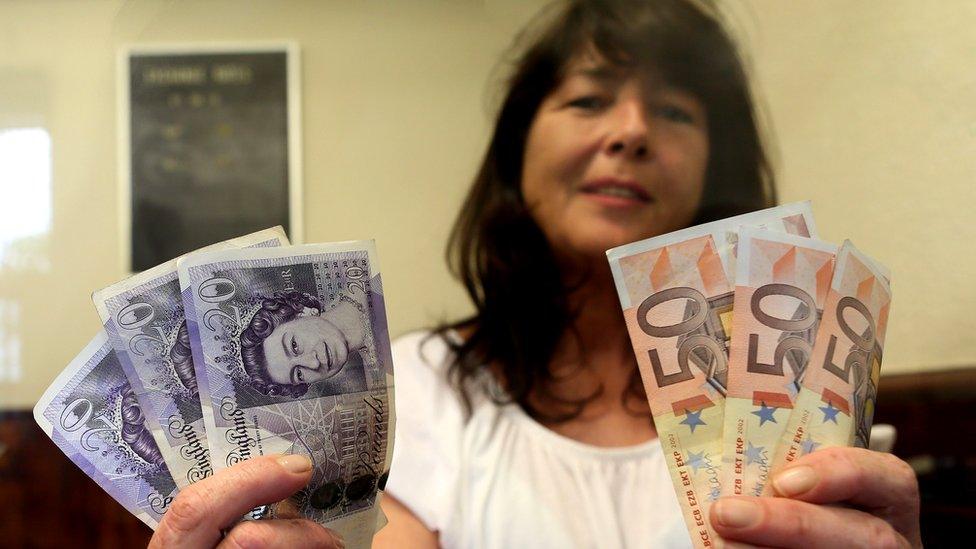Leo Varadkar: 'Too early' to assess Brexit progress
- Published
- comments
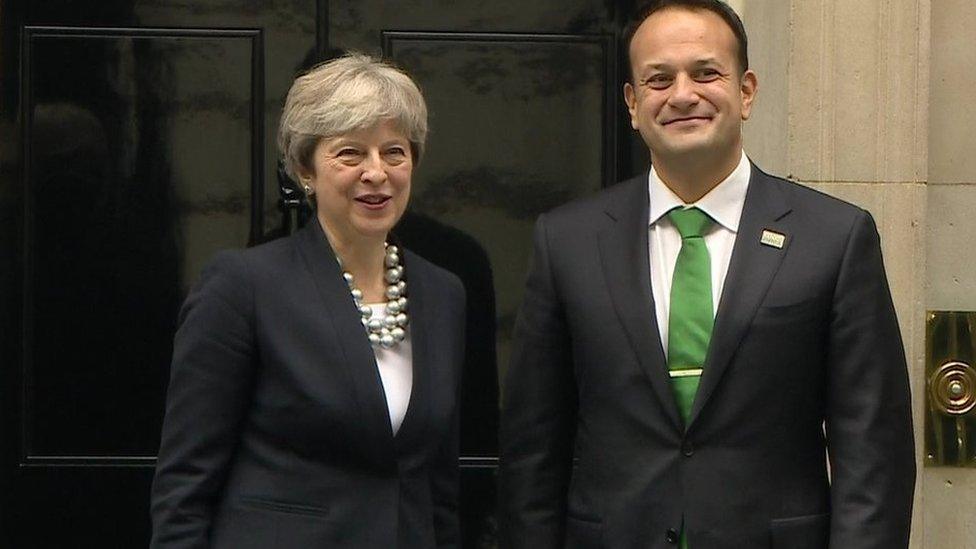
Theresa May greets Leo Varadkar at 10 Downing Street
It is too early to say whether the UK has made sufficient progress in Brexit talks, the Irish prime minister has said.
Taoiseach Leo Varadkar was speaking after talks with Prime Minister Theresa May in Downing Street.
Mr Varadkar gave Mrs May's speech in Florence a cautious welcome.
Speaking to reporters following their talks, he said her proposal for a post-Brexit transitional period was a step in the right direction.
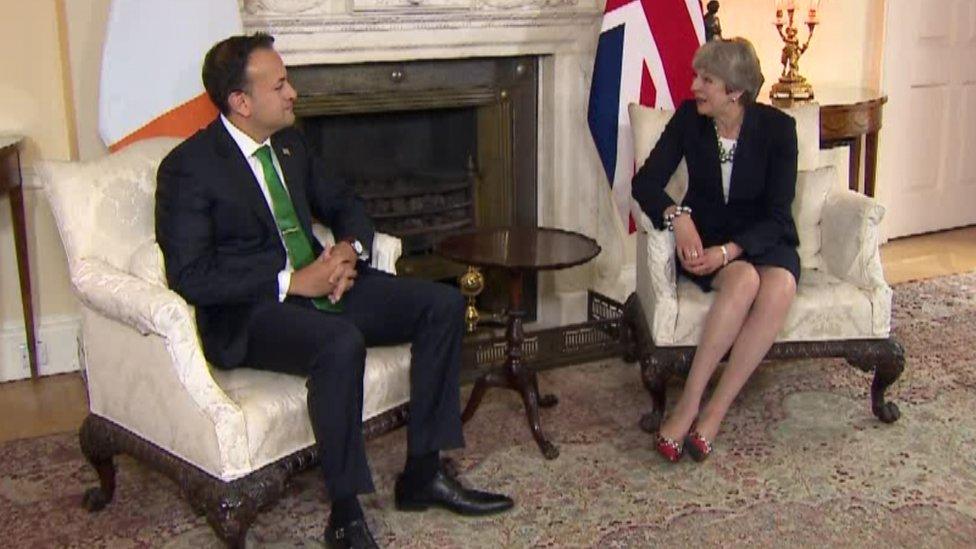
Mr Varadkar's visit is Mrs May's first meeting with a European leader since her Florence speech last week
Mr Varadkar said the two leaders were in a "shared space" on trying to get Northern Ireland's Executive up and running again - adding that it was important that the UK government did not want any form of physical border on the island of Ireland.

Analysis: BBC News NI political editor Mark Devenport
Mr Varadkar said neither he nor the Prime Minister are contemplating failure in their efforts to restore devolution at Stormont.
He played down the need for external intervention and said he could see no advantage in holding another Stormont election. He also registered his strong opposition to direct rule from Westminster.
On Brexit, the Taoiseach welcomed the Prime Minister's commitment last week that there should be no physical infrastructure on the border between Northern Ireland and the Irish Republic.
He said Brexit negotiations between the EU and the UK have, so far, not made sufficient progress to allow the talks to move on to discuss a trade deal after the UK's departure.
However, he said that may change by the end of October when European leaders meet in Brussels.

Sinn Féin's Stormont leader Michelle O'Neill said the Irish government must assert itself to defend the interests of all Irish citizens.
"The DUP's support for the right-wing Tory Brexit means there is a greater onus on Dublin to use its influence at the negotiating table with the other European states," she said.
Speaking ahead of an event at the Labour Conference in Brighton, SDLP leader Colum Eastwood described Brexit as a "political tsunami", which would come crashing down.
'Madness beyond description'
"It is madness beyond description that the place set to be most affected by this crisis has no voice in the negotiations," he added.
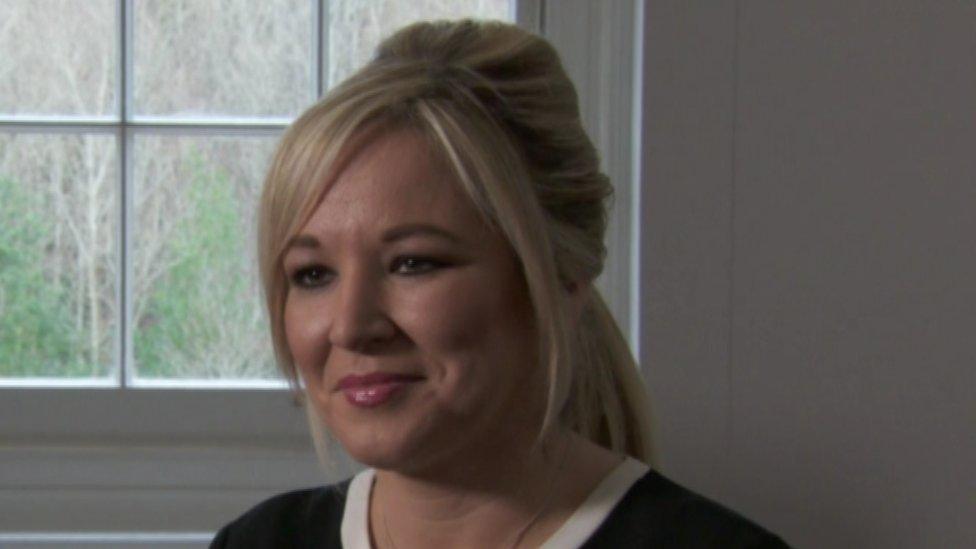
Michelle O'Neill said Mr Varadkar's government must assert itself
Shadow NI Secretary Owen Smith said the government must consider a post-Brexit solution where Northern Ireland retained some form of membership of the Single Market and the Customs Union.
He said such a move would be an 'imaginative solution'.
Former NI secretary Peter Hain said not enough progress had been made in the Brexit negotiations.
"Theresa May's hard Brexit policies will create serious difficulties for Northern Ireland, sabotaging the Good Friday Agreement, putting jobs at risk by restricting cross-border trade and complicating the rights of Northern Irish citizens who travel to the Republic for work and to visit relatives," he added.
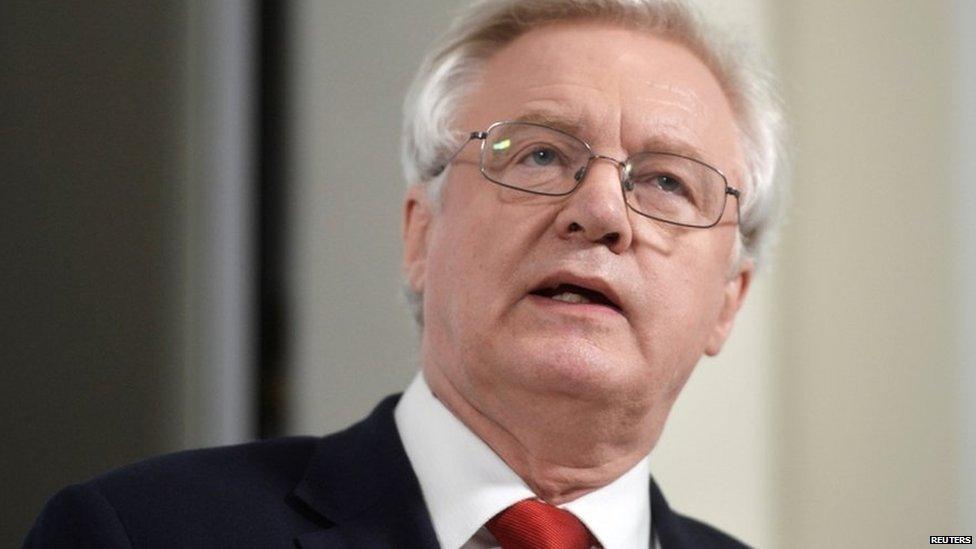
David Davis said there was a desire to maintain the Common Travel Area
Brexit Secretary David Davis has said the UK and EU will be "crunching through the technical detail" when they discuss Northern Ireland in Brussels on Wednesday.
Mr Davis said there was a shared desire to maintain the Common Travel Area (CTA) and protect the Good Friday Agreement.
He said the two sides needed to work through the details to make that happen.
'Black hole'
In her speech in Florence on Friday, the Prime Minister offered to continue paying into EU coffers during the transition period to ensure the bloc is not left with a budget black hole.
Mrs May said there should be a two-year transition period after the UK leaves the EU in 2019, during which trade would continue on current terms.
Mrs May restated the UK's position that there would be no hard Irish border after Brexit.
Although the UK will be leaving both the customs union and the single market, she said that both the UK and EU had "stated explicitly" they would not accept any "physical infrastructure" along the frontier.
Following Monday's meeting, Downing Street said that maintaining the current British and Irish Common Travel Area and the citizenship rights guaranteed by the Good Friday Agreement are at the heart of the government's approach to Brexit.
Number Ten said the Prime Minister and the Taoiseach also discussed a trade dispute between US Aircraft manufacturer Boeing and Canadian plane maker Bombardier, which has a plant in east Belfast.
The leaders expressed their shared concern about the impact this could have on jobs and livelihoods in Northern Ireland.
Meanwhile, the Welsh first minister has said that, when it comes to discussions with the UK government about Brexit, Northern Ireland's voice is "not being heard."
Speaking at the Labour Conference in Brighton, Carwyn Jones told the BBC "a Westminster minister can never have the same kind of clout or knowledge that a politician from Northern Ireland, or politicians can have".
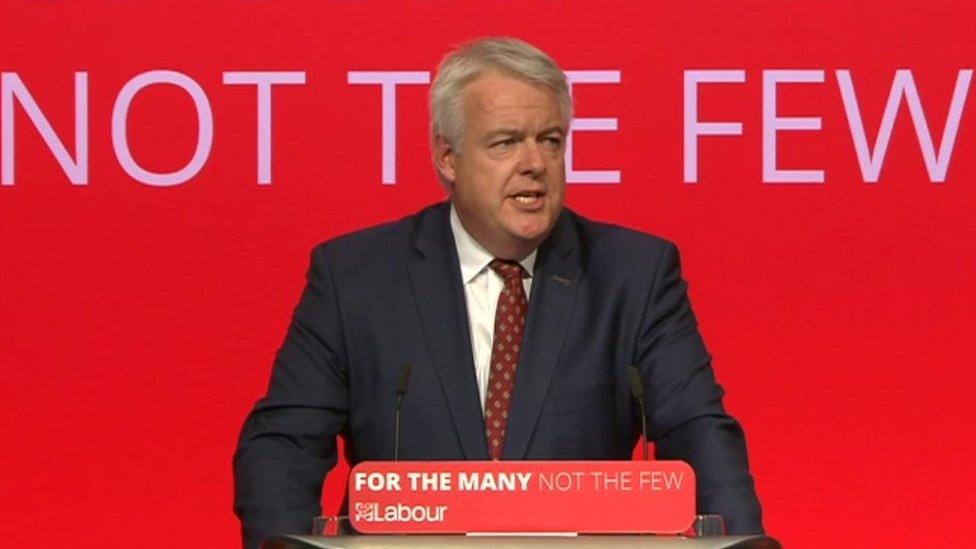
Welsh First Minister Carwyn Jones said Brexit trading issues could not be addressed until the question of the Irish border was resolved
He said the issue of the Irish border needed to be given the top priority in discussions between the UK and the EU.
"Unless you resolve the issue of the border you cannot resolve issues around the single market and the customs union. The UK can not be out of the customs union but have an open and patrolled border with a country that is in the customs union - it just does not work," Mr Jones said.
He said the UK should stay in the single market, and said the experience of Norway should be used as an example.
Northern Ireland has effectively been without a devolved government since January.
Its institutions collapsed amid a bitter row between the DUP and Sinn Féin about a botched green energy scheme.
Several rounds of talks have failed to reach an agreement.
- Published22 September 2017
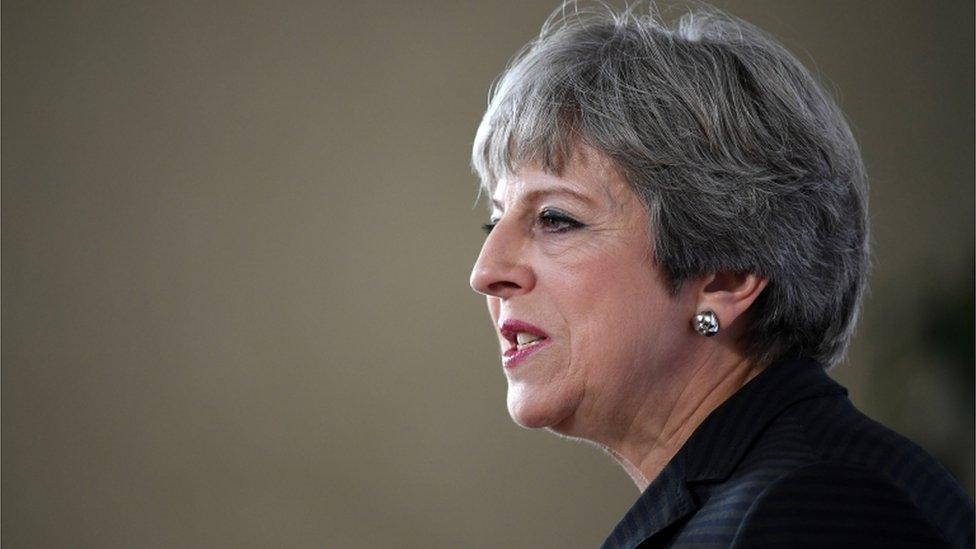
- Published25 September 2017
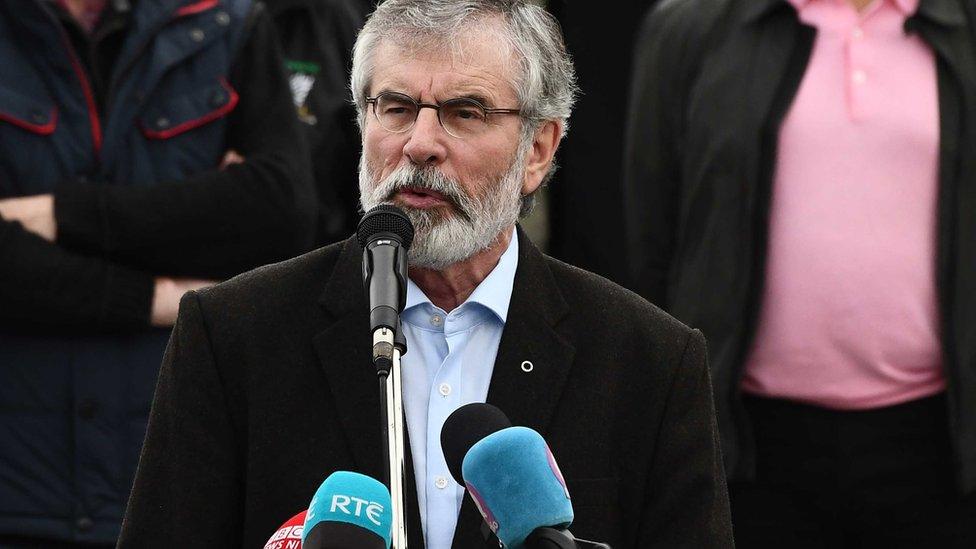
- Published20 September 2017
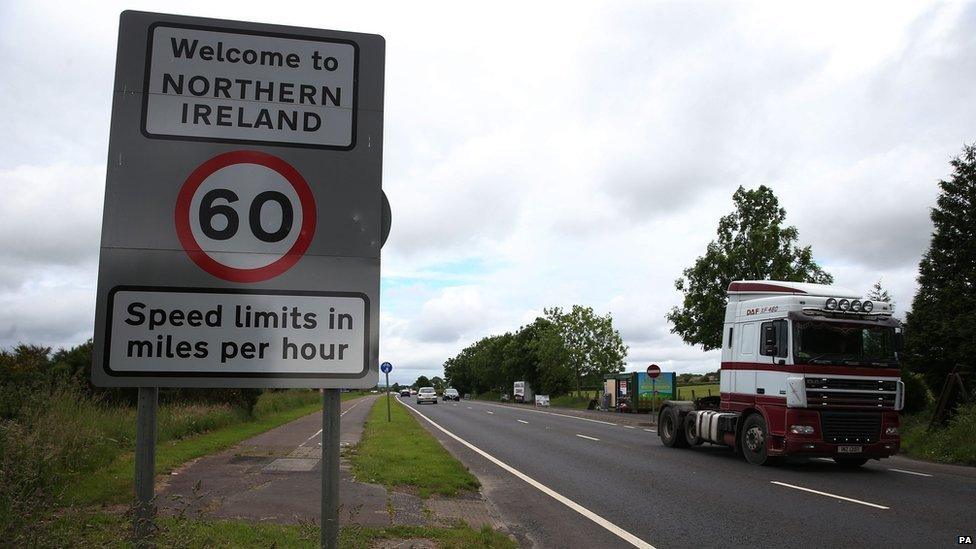
- Published31 August 2017
